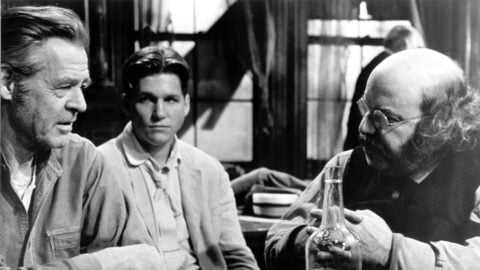Film of the Week: Nightcrawler

Given that Nightcrawler is all about TV journalism, its content hardly screams “Breaking News.” The film reveals that freelance TV news-gathering is a nasty, amoral business, and that TV news-broadcasting is sensationalist and cutthroat, a fertile breeding ground for opportunistic bottom-feeders. There seems little to add but to ask: so, what else you got? Even so, while Nightcrawler is neither revelatory nor exactly up-to-the-minute, still this debut feature from writer-director Dan Gilroy (brother of Tony, and writer on The Bourne Legacy, Real Steel, and Tarsem’s insane The Fall) has an efficient, concentrated punch. It’s a no-nonsense, old-school exercise, with a tinge of borderline trashiness, down to that Eighties-sounding electric guitar in James Newton Howard’s score. But its oddly archaic feel makes Nightcrawler enough of an anomaly among 21st-century thrillers to feel distinctive, sufficiently vintage to feel fresh again.
The film’s trump card is Jake Gyllenhaal, who, following the intense eccentricity of his two recent roles for Denis Villeneuve—a doppelgänger duo in Enemy, a doggedly compelled detective in Prisoners—seems to have set his heart on being the weirdest on-screen presence in North American cinema. Like Joaquin Phoenix in The Master, Gyllenhaal plays a character who seems to fit so awkwardly in his own skin that you get a pain in the shoulderblades just looking at him. Gyllenhaal plays Louis Bloom, a man who spends his nights awake in Los Angeles, initially scavenging scrap metal to resell, which he does with a disarming eager-beaver spiel: “Who am I? I’m a hard worker, I set myself goals, and I like to be consistent.”
Who is he, indeed? Some insomniac with a troublesome mental profile, an indomitable survival instinct, and a tendency to spout glib, pre-digested management-motivational nonsense. Living in a drab box of an apartment with his TV for company, he’s like a super-debased cut-price descendant of the existential loners that once populated Jean-Pierre Melville films (and Walter Hill’s tributes to them).

The fundamental logic of obsession stories is that characters blunder by chance into the thing that becomes their fetish, their raison d’être. That’s what happens to Louis when he discovers that there are armies that roam the Los Angeles night looking for catastrophes that they can film and sell as hard news—crimes, killings, messy arrests. He chances on one such scene, learns from veteran nocturnal cameraman, or “nightcrawler,” Joe Loder (Bill Paxton) that “if it bleeds, it leads,” and realizes that Loder’s profession is a viable career option for a man with a head full of delusions and a flexible body clock.
Exchanging a stolen bike for a secondhand video camera, Louis is initially inept at his new profession but is prepared to break all the rules of professional and moral decorum observed even by Loder. He acquires the tricks of the trade (learning how to read police codes like a good Boy Scout), and picks up sales technique: like a robotic learning machine, he sees, hears, absorbs all. He soon has sufficiently juicy material to impress the news editor at failing TV station KWLA, Nina (Rene Russo), whose idea of quality material is simple: “Think of our newscast as a screaming woman running down the street with her throat cut.”
Nina has an unashamedly sensationalist and racist agenda: she wants shock stories about white victims of black violence, “urban crime creeping into the suburbs.” Louis soon chances on a prize scare story: a case of rich white folks slaughtered in their luxury home, complete with blood-splashed walls, a heart-stopping child’s-nursery shot, and even perps high-tailing it in their getaway vehicle (of course, he keeps the best bits under wraps for future use).

He’s now indispensable to the station and he knows it, as we see in a genuinely squirm-inducing restaurant scene: he’s soon pressing Nina for funding and for sexual favors, in the same wheedling, smiling, blandly corporate tones (“I have to think that you are invested in this transaction”). An equally appalling, but more overtly comic, scene has him posturing like a knight of the boardroom as he gives a job interview to the luckless Rick (the excellent British actor Riz Ahmed), plying him with empty motivational verbiage (“I’m giving you a chance to explore career options,” i.e., “I’m going to exploit you mercilessly—and you’ll be grateful”). There’s a nice reprise of this scene later on, when Rick, now desperate—earning next to nothing and realizing he’s putting his life on the line—nevertheless allows himself to be suckered by more shiny words, to be precise, the title Executive Vice President.
Nightcrawler contains some clunky overstatement: would someone like Nina ever really come out with anything as excruciatingly quotable as that “screaming woman” line? Or Loder with “if it bleeds…”? Only if they’d heard the lines in a bad movie. Yet Nightcrawler persuade us that we’re looking at a world in which everyone gets by without thinking for themselves, idly recycling thirdhand lines that they’ve picked up somewhere—which lets them concentrate on following their self-preservation instinct undistracted. Meanwhile, such is the film’s bitter cynicism that the two ostensibly decent characters—the nebbishy Rick, and Nina’s colleague-with-a-conscience, played by Mad Men’s Kevin Rahm—are depicted as doomed-to-extinction milksops who can barely get a line out, let alone a pithy one.
But if Nightcrawler is often heavy-handed, it’s also effectively gripping. In a way, its quotient of cliché brings a dash of B-movie timelessness—or at least, out-of-timeness, in that it doesn’t really feel like a 2014 film. There’s a harsh, neon brassiness about the film that’s very Eighties: not just in the climactic car chase action (in a way, as opportunistic as Louis himself), but in the overall look, with DP Robert Elswit giving Los Angeles and its night lights a synthetic metallic sheen, with echoes of Michael Mann, from Thief to Collateral.

Louis is the kind of quietly feral monomaniac that James Woods might have played in his prime. He’s not entirely believable or consistent as a character, shifting seamlessly from sycophantic underling to strutting faux exec as he teaches Rick to kowtow to him. But the smartness of Gilroy’s script is that it tells us next to nothing about Louis. With no backstory, he’s a stranded delayed adolescent, flailing for himself in the city and inventing himself as he goes along—the sort of work for which it helps not to have such unnecessary ballast as a soul. His ferocious capacity for delusion makes him a nephew to Rupert Pupkin—but I’m also reminded of Tom McCamus’s actor turned impostor in the largely forgotten but very effective David Wellington’s I Love a Man in Uniform, a film that similarly suggested that people accidentally walk into the role that becomes their destiny, whether they really know their lines or not.
And the fact that we know nothing about Louis makes his relationship with Nina all the more effectively perverse: we can just tell that this is a boy with horrific oedipal issues. Somehow, he’s able to see right through to her weaknesses—he knows that, personally and professionally, she’s deeply disappointed with her life, and he’s not afraid to twist the knife. Russo, age 60 and playing Nina knowingly as a hardboiled faded coquette, gives a steely performance that shows no vanity and no mercy towards herself; if writer-director Gilroy weren’t her husband, you might consider this casting decision as cruel as it’s astute.
Gyllenhaal, merely, is mesmerizingly odd, delivering Louis’s mantras with almost churchy piety, the better to bring out their manic hollowness. He lifts this film several notches with his physical presence alone: skeletal, oddly greasy from Louis’s topknot down, and with a stare that looks as if it’s been painted directly onto his eyelids. His central presence helps make Nightcrawler vivid and fresh, even if what it has to say about its subject looks a little old hat. (But then, part of the film’s argument is that TV itself has become slow and antiquated, desperately struggling to keep up with the pace of events in the age of instantaneous online news.)
And still the industry keeps feeding itself: the closing punch-line is bathetic in its crunching irony, but the scene itself makes its point, as Louis addresses a group of eager new recruits who are about to start the worst job they’ll ever have, under the worst boss imaginable. Nightcrawler might feel a little dated overall, but it makes one observation that’s nothing if not current: it’s set in a world in which a young workforce is only too willing to get its blood sucked for a platter of promises and shiny managerial rhetoric.







